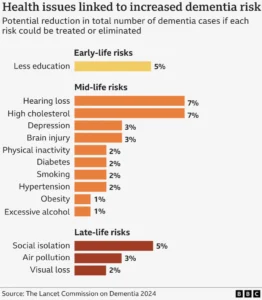With the recent heat spell in northeast Ohio and throughout the US, many of you might have been following the EPA’s Air Quality Index (often cited on your smartphone’s weather app). Air quality and air pollution was recently recognized as a growing “target” for cognitive health. Avoiding bad air quality and securing air quality in our homes can be helpful, if not a game changer, for some people. Data suggests that, especially later in life, avoiding air pollution and unhealthy air decreases the risk for Alzheimer’s and related neurodegenerative diseases.

According to the Lancet Commission on Dementia (2024), exposure to air pollution could account for 3% of dementia cases worldwide, as seen in this graphic. This makes it a critical factor to address in efforts to reduce dementia risk.
If you live in northeast Ohio you can get more information about air quality and trends about some of the key toxins in the air like: carbon monoxide, lead, nitrogen dioxide, ozone, particulate matter, and sulfur dioxide from organizations like Northeast Ohio Areawide Coordinating Agency. https://www.noaca.org/regional-planning/air-quality-planning
The good news is something as simple as a quality air filter in rooms you spend the most time in can promote better cognitive health. For some people, a deeper evaluation of your indoor air quality is indicated.
For KCW current members – ask your coach about your status or bring this up at your next visit with us!
-Dr. Nate Bergman, DO





